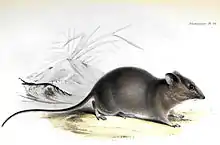Aegialomys
Aegialomys is a genus of oryzomyine rodents from the lowlands and mountains of western Peru and Ecuador, including the Galápagos Islands. The species in this genus have historically been placed in Oryzomys, but according to cladistic research, the genus is more closely related to a group containing, among others, Nectomys and Sigmodontomys, than to Oryzomys. The generic name Aegialomys means "coastal mouse" in Ancient Greek (αιγιαλός "coast" and μῦς "mouse") and references the mostly coastal occurrence of the genus.
| Aegialomys | |
|---|---|
 | |
| Aegialomys galapagoensis | |
| Scientific classification | |
| Kingdom: | Animalia |
| Phylum: | Chordata |
| Class: | Mammalia |
| Order: | Rodentia |
| Family: | Cricetidae |
| Subfamily: | Sigmodontinae |
| Tribe: | Oryzomyini |
| Genus: | Aegialomys Weksler et al., 2006 |
| Species | |
Aegialomys species have a greyish to buff dorsal pelage which is divided sharply from the white to light yellow ventral pelage. They have relatively short ears. There are crowns of hair at the bases of the toes. The tail is equal to or longer than the body and is darker above than below.
There are two commonly recognized and described species in the genus: the mainland A. xanthaeolus, the type species, and A. galapagoensis. There is however a third, undescribed species occurring on the Ecuadorian coast and the status of the two junior synonyms of A. xanthaeolus, ica Osgood, 1944 and baroni J.A. Allen, 1897, is currently unresolved. Also, the subspecies A. galapagoensis bauri is sometimes considered a separate species.
References
- Weksler, M.; Percequillo, A. R.; Voss, R. S. (2006-10-19). "Ten new genera of oryzomyine rodents (Cricetidae: Sigmodontinae)". American Museum Novitates. American Museum of Natural History. 3537: 1–29. doi:10.1206/0003-0082(2006)3537[1:TNGOOR]2.0.CO;2. hdl:2246/5815.